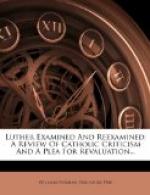On the basis of Alegretti’s notes, Ranke has drawn a fine pen-picture of the reign of terror which Caesar Borgia, the favorite son of Alexander VI, inaugurated at Rome. “With no relative or favorite would Caesar Borgia endure the participation of his power. His own brother stood in his way: Caesar caused him to be murdered and thrown into the Tiber. His brother-in-law was assailed and stabbed, by his orders, on the steps of his palace. The wounded man was nursed by his wife and sister, the latter preparing his food with her own hands, to secure him from poison; the Pope set a guard upon the house to protect his son-in-law from his son. Caesar laughed these precautions to scorn. ’What cannot be done at noonday,’ said he, ‘may be brought about in the evening.’ When the prince was on the point of recovery, he burst into his chamber, drove out the wife and sister, called in the common executioner, and caused his unfortunate brother-in-law to be strangled. Toward his father, whose life and station he valued only as a means to his own aggrandizement, he displayed not the slightest respect or feeling. He slew Peroto, Alexander’s favorite, while the unhappy man clung to his patron for protection, and was wrapped within the pontifical mantle. The blood of the favorite flowed over the face of the Pope.—For a certain time the city of the apostles and the whole state of the Church were in the hands of Caesar Borgia. . . . How did Rome tremble at his name! Caesar required gold, and possessed enemies. Every night were the corpses of murdered men found in the streets, yet none dared move; for who but might fear that his turn would be next? Those whom violence could not reach were taken off by poison. There was but one place on earth where such deeds were possible—that, namely, where unlimited temporal power was united to the highest spiritual authority, where the laws, civil and ecclesiastical, were held in one and the same hand.”
Pope Julius, who came into power after the twenty-six days’ reign of Pius III, was a warlike man. “He engaged in the boldest operations, risking all to obtain all. He took the field in person, and having stormed Mirandola, he pressed into the city across the frozen ditches and through the breach; the most disastrous reverses could not shake his purpose, but rather seemed to waken new resources in him.” “He wrested Perugia and Bologna from their lords. As the powerful state of Venice refused to surrender her conquests, he resolved at length, albeit unwillingly, to avail himself of foreign aid; he joined the League of Cambrai, concluded between France and the Emperor, and assisted with spiritual and temporal weapons to subdue the republic. Venice, now hard pressed, yielded to the Pope, in order to divide this overwhelming alliance. Julius, already alarmed at the progress of the French in Italy, readily granted his forgiveness, and now commenced hostilities against the French and their ally, Alphonso, Duke of Ferrara. He declared




